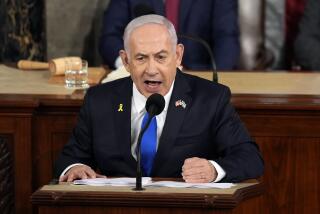Obama rejects ‘bluster’ over Iran but assures Israel’s supporters
President Obama cautioned against “bluster” and “loose talk of war” with Iran even as he assured U.S. supporters of Israel that he will use American military force if necessary to prevent Tehran from obtaining a nuclear weapon.
In an address heavy with election year defenses of his record, Obama argued Sunday that open talk of war in recent weeks has benefited the Iranian government by causing a run-up in the price of oil, Iran’s main export. He told an audience of thousands at the American Israel Public Affairs Committee annual conference that opponents of Iran’s nuclear program should wait to see the impact of new economic sanctions on Iran’s oil and banking sectors. The sanctions take effect this summer.
“Now is the time to let our increased pressure sink in, and to sustain the broad international coalition we have built,” Obama said. “Now is the time to heed that timeless advice from Teddy Roosevelt: Speak softly. Carry a big stick.”
The admonishment against war talk seemed aimed primarily at Israeli Prime Minister Benjamin Netanyahu — with whom Obama is scheduled to meet Monday in Washington — and Netanyahu’s backers in Congress, as well as the Republican presidential candidates. Officials close to Netanyahu have hinted broadly at Israeli airstrikes against Iranian nuclear sites this year, and some prominent Republicans have chastised Obama for opposing that idea.
At the same time, Obama warned Iran that his preference for diplomacy is not as important as results. “When it comes to preventing Iran from obtaining a nuclear weapon, I will take no options off the table, and I mean what I say,” he said.
As he did in an interview released Friday, Obama emphasized that he would not accept “containment” — living with Iran having a nuclear weapon and hoping to deter its use — as a strategy.
“Iran’s leaders should understand that I do not have a policy of containment; I have a policy to prevent Iran from obtaining a nuclear weapon,” he said.
Iran says its nuclear program is for peaceful purposes.
Obama also sought to bolster his position with pro-Israel voters by emphasizing his commitment to the country, proclaiming that in his three years in office, “at every crucial juncture, at every fork in the road, we have been there for Israel. Every single time.”
“You don’t just have to count on my words. You can look at my deeds,” he said, noting increased U.S. spending on defense aid to Israel, improved sharing by the two nations on intelligence and military matters, and his administration’s support during diplomatic crises in the Middle East.
Republicans were quick to fire back. Even before Obama’s speech, Elizabeth Cheney, daughter of former Republican Vice President Dick Cheney, drew loud applause from some at the conference when she asserted that no president has done more to “delegitimize and destabilize the state of Israel in recent history than President Obama.”
Campaigning in Memphis, Tenn., Rick Santorum scoffed at Obama’s assertion that “too much loose talk” of war would help Iran. “Loose talk of Republicans?” he said. “The best thing that could happen in the world markets is an Iran without a nuclear weapon and a new Iranian regime, neither of which he is doing very much about to make happen.”
Newt Gingrich, appearing on CNN’s “State of the Union,” said: “You’ve had no evidence that the president is prepared to take steps to stop Iran from getting nuclear weapons. They talk and the Iranians build.… I mean, we’re being played for fools.”
At a stop in Georgia, Mitt Romney said that the president’s approach to Iran had failed the American people and made the nation less secure, in part by failing to impose “crippling sanctions against Iran.”
“He’s also failed to communicate that military options are on the table and in fact in our hand,” Romney said, “and that it’s unacceptable to America for Iran to have a nuclear weapon.”
Obama, in his speech and previous remarks, insisted he has made that point clear, repeating his willingness to use military force if needed and arguing that the steady escalation of sanctions has caused “an immediate bite on the Iranian regime.”
At the same time, he executed a subtle shift in emphasis from the points he had stressed in his interview with Atlantic magazine journalist Jeffrey Goldberg, which was released Friday. As in the interview, Obama emphasized that military action against Iran is an option. In Sunday’s speech, however, he dwelled more on the arguments for patience. Although Israeli officials and some in Congress have warned that time is running out to deal with Iran, Obama insisted that world powers must use the “time and space that exists” to search for a nonmilitary solution.
The shift in messaging reflects the buildup toward Monday’s meeting with Netanyahu. Aides say the president’s top priority is to persuade the Israeli leader to give the sanctions more time to work, let the pressure on Iran build, and refrain from military strikes that could plunge the region into chaos.
Obama devoted only a short section of his speech to the Israeli-Palestinian issues that have historically dominated U.S.-Israeli diplomacy. Though the Netanyahu government believes the Iran threat needs to be resolved first, Obama argued that Israel needs to press ahead with the peace issue and not surrender to “cynicism.”
The speech drew a mixed reaction, as have the president’s previous appearances at the conference. Obama said “welcome things” on Iran, said Josh Block, a former spokesman for the American Israel Public Affairs Committee. He was “making clear that he has a policy of prevention, not containment, explicitly pointing to a military option, delivering an extended explanation of why it is America’s interest to stop Iran, and in particular making explicitly clear that Israel has a sovereign right to defend themselves as they see fit.”
In remarks that preceded Obama’s speech and seemed designed to counter criticism, Israeli President Shimon Peres called the president “our great friend” and told the conference that there is “no space” between Obama and Israel on the issue of Iran.
Speaking in Canada, where he stopped before arriving in the U.S., Netanyahu thanked Obama for his remarks.
“Perhaps most of all, I appreciate his declaration that Israel must be capable of defending itself, by itself, against any threat,” Netanyahu said.
Times staff writers Edmund Sanders in Jerusalem, Robin Abcarian in Memphis, Maeve Reston in Snellville, Ga., and Ian Duncan in Washington contributed to this report.
More to Read
Sign up for Essential California
The most important California stories and recommendations in your inbox every morning.
You may occasionally receive promotional content from the Los Angeles Times.












